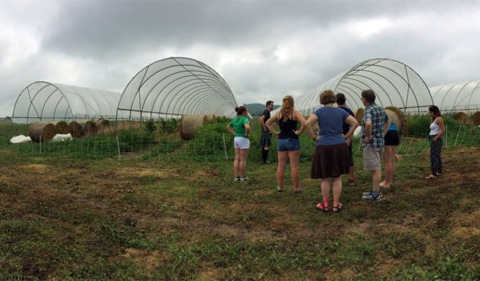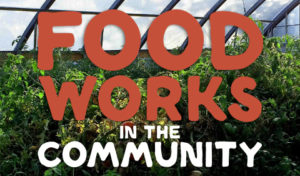
Summer 2016 interns tour a local farm.
By Anna Chleboun ’15
The Food Studies theme is proud to be offering its fourth semester of CAS 4911: How Food Works in the Community Internship experience.
What started as a summer internship experience has now been extended into the fall and spring semesters, offering even more opportunities for students to get real, hands-on experience at Ohio University as well as in the Athens County food systems.
“Interning with Food Studies was a fulfilling internship where I was not only able to learn about various plants and garden tasks, but also connect to the community. My favorite part of my internship was the weekly veggie sales where the garden could give back to the community, said Brianna Baer, junior in Molecular Biology and a Summer ’16 garden intern. “I was also given the opportunity to better see how the community food system works including the waste plant, OHIO recycling center, and various other gardens/farms from Athens. Nothing is better than enjoying food in Athens than experiencing it hands on.”
 The internship, for 2-4 credit hours, offers students a way to understand how food works in the Athens and OHIO community. Students work on issues connected to food security, production, processing, marketing, distribution, consumption, composting, food choices and food culture, including the student-run produce sale. In the past, students have done internships with the Plant Biology Learning Gardens, and with community organizations such as Community Food Initiatives, the Athens Regional Food Policy Council, and Rural Action.
The internship, for 2-4 credit hours, offers students a way to understand how food works in the Athens and OHIO community. Students work on issues connected to food security, production, processing, marketing, distribution, consumption, composting, food choices and food culture, including the student-run produce sale. In the past, students have done internships with the Plant Biology Learning Gardens, and with community organizations such as Community Food Initiatives, the Athens Regional Food Policy Council, and Rural Action.
Spring 2017 semester offers a unique opportunity for students to work closely with the Office of Sustainability to get more local food into the OHIO food system. Students would work through issues of procurement and sourcing, working between small-scale producers and a large institution.
“In my internship managing the gardens, I learned to appreciate an often overlooked part of the chain of food production from field to plate. For such a (relatively) small area of land to work, it took many, many man hours to produce what society takes for granted nowadays,” said Anthony Susco, a junior in Environmental and Plant Biology and a Summer ’16 garden intern.
Growing healthy, productive crops that aren’t made in a laboratory and planted in the field is quickly becoming a lost art that we cannot afford to lose. The majority of commercial agriculture in America is taking place in gigantic agribusiness corporate farms in California and Mexico, and while this actually makes sense from a business accounting point of view, it is immeasurably detrimental to the food system in the US.”
Contact Dr. Theresa Moran (morant@ohio.edu) or Dr. Art Trese (trese@ohio.edu) for more information.



















Comments